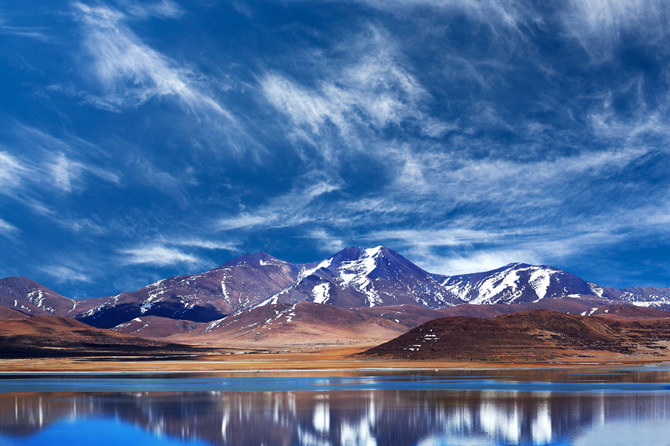Nations must prepare for the shocks that war and climate change always bring

https://arab.news/6kd64
We are all facing a time of great uncertainty and change. We are all facing shocks from different sides. Whether you are a poor person in a slum in India, a rich person in Switzerland, or a middle-class person in China, you will feel them. But each person has a different ability to survive shocks and uncertainty. Everyone needs to be resilient in his or her own way.
A country’s resilience can take on a similar character to a person’s resilience. A country is made up of people. Importantly, the responsibility of leaders is not just to themselves or their families, but to their country, society, and those they are tasked to lead.
How can a leader look to make a more resilient economy and society? That may be one of the most important questions for today and well into the future, given how so many things may develop and play out.
All leaders should expect economic shocks. The energy and food shocks that emanate from the Russia-Ukraine war could be with us for some time. The energy shocks from underinvestment during the COVID-19 pandemic have yet to work themselves through. How many of these were expected in advance? It is the nature of life that unexpected things happen. And sometimes they send shockwaves across the world.
Crops are being damaged by heat and low rains in important regions that grow food, ranging from India to Texas. Wheat-vulnerable countries, the big importers like Egypt, need to find alternative sources of wheat and other foods, given their previous reliance on Russia and Ukraine.
The reliance of the world on oil, gas, and coal have brought economic and social shocks. Many of these shocks are brought about by politics, war, conflict, and poor investment decisions. Others are brought with weather and climate shocks.
Much of the world is planning to move toward more renewable energy. Renewable energy is highly reliant on minerals and metals that come from mostly developing countries. Some of these countries are quite unstable. Unless the world understands what may be coming the world could be trading off risks from oil, gas, and coal to bets on cobalt, lithium, and copper.
Many countries, especially those in the Middle East and North Africa region and South Asia, face water shortages, and rising risks in the future of further severe water stress. If one focuses on the important Tibetan Plateau, the water tower of Asia, one can see where this might be heading for that part of the world — and many others.
Having a resilient society in the face of shocks could make an enormous difference in how these shocks play out and how a country survives and even prospers from them.
Dr. Paul Sullivan
Hundreds of millions of people rely on the glacial melt and the weather patterns of the Tibetan Plateau and the Himalayas. The Tibetan Plateau is heating up. This month India and Pakistan have suffered horrible heat waves. Some of that heat made its way up to the mountains, causing forest fires, which have melted ice and snow.
The Indians, Pakistanis, Chinese, and those in Southeast Asia, and others are worried about their water supplies in the future. Important rivers that find all or part of their sources in the plateau are the Indus, Sutlej, Ganges, Yarlung Tsangpo, Brahmaputra, Yellow, Yangtse, Salween, Irrawaddy, and Mekong. A huge part of the world’s population is reliant on a place few have even heard of — The Tibetan Plateau.
The Arctic is warming faster than most other parts of the world. Some of this is due to climate change. Some of it is due to something called the albedo effect, which can magnify climate change. Simply put when the ice and snow melt in the Arctic the sun’s rays are not reflected as much as before. Light snow and ice are more reflective than dark water and land.
An explanation may be needed. How many of you reading this in desert countries of the MENA region would much rather have a light-colored car than a dark-colored car in the summer. Darker cars heat up faster and to a degree than lighter colored cars. That is the albedo effect at work.
When the Arctic warms it can raise sea levels with melting ice and snow. The changes in the weather and climate in the Arctic can affect ocean tides and wind currents over vast areas. These tides and wind currents can drive weather across the world. The world’s weather is interconnected in complex ways. What happens in the Arctic can affect weather patterns across the world. The world is a smaller place than most imagine.
As the Arctic melts new transport routes could be developed with shorter distances between Asia and Europe. Some of these transport routes could bypass the MENA region making these economies more fragile and less supported. This will not happen anytime soon, but if we keep up with our current energy, agriculture and industrial policies without any reasonable change one could expect things like this to happen.
How does a leader prepare for the future? By understanding that economic, political, climate, and other shocks that may happen. Denying they may happen is like the ostrich putting its head in the sand. The ostrich accomplished nothing but putting its head in the sand. Setting up preparations for potential future shocks can save people from difficulties they need not experience.
Part of these preparations include developing economic, political, health, and social resilience, but also spiritual, moral, and ethical resilience. Having a resilient society in the face of shocks could make an enormous difference in how these shocks play out and how a country survives and even prospers from them.
Nobody knows what the future will bring. But it is important to study and advise on what might happen and what might be the best ways to adapt, mitigate, survive, and prosper from those changes.
Stability, security, and resilience can be illusory. Frankly, it often is. Think of the countries in your regions that most everyone considered stable, secure, and resilient — until they were not.
• Dr. Paul Sullivan is a senior research associate at KFCRIS and a non-resident fellow, Global Energy Center, Atlantic Council.










































